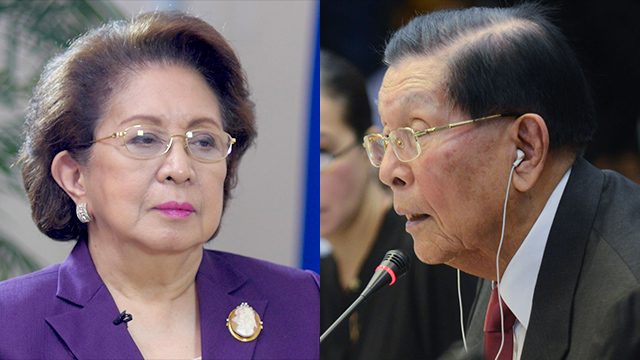SUMMARY
This is AI generated summarization, which may have errors. For context, always refer to the full article.

MANILA, Philippines – In more than 4 years of heading the agency tasked to investigate and prosecute erring public officials, Ombudsman Conchita Carpio-Morales considers the Supreme Court’s (SC) granting of bail to Senator Juan Ponce Enrile as the lowest point of her career.
Morales, an associate justice of the High Court before her mandatory retirement and subsequent appointment as Ombudsman, said she was “frustrated” that the 91-year-old Enrile was released on “humanitarian grounds” – a reason which the senator did not even invoke in his petition.
“As an Ombudsman, I was frustrated. Because if I recall correctly, his being ill or sick was never raised as a ground for petition for bail at the lower court (Sandiganbayan)… It was only, I think, when he wanted to be detained at the hospital that he raised his being ill or sick to justify detention at the hospital,” Morales said in a Rappler Talk interview.
After more than a year under hospital arrest over the pork barrel scam, Enrile was freed in August 2015 after SC magistrates, voting 8-4, allowed him to post bail on humanitarian grounds. (READ: Behind the SC decision on Enrile’s bail)
Enrile and two other senators face plunder and graft charges over the biggest corruption scandal in recent Philippine history. They are accused of pocketing millions in public money and diverting development funds to fake non-governmental organizations allegedly controlled by Janet Lim-Napoles.
The two other senators – Jinggoy Estrada and Ramon Revilla Jr – are currently detained.
In his petition for bail, Enrile argued that he was not a flight risk, and that the prosecution did not establish strong evidence of guilt to deny him bail. He also asked the court to consider “mitigating circumstances” such as his advanced age and voluntary surrender.
The High Court’s majority decision has been called a “special accommodation” for Enrile by SC justice Marvic Leonen in his dissenting opinion, while then-justice secretary Leila de Lima said the unprecedented ruling set a “dangerous” precedent for cases involving non-bailable offenses.
Two weeks after Enrile went free, the Ombudsman asked the SC to reverse its decision.
“We certainly opposed, we filed a motion for reconsideration. And it’s still pending. We believe that our position is very strong,” Morales said.
In its September 2015 motion, the Ombudsman said the SC verdict altered “constitutional principles governing the right to bail” by allowing Enrile to be released even in the absence of a bail hearing.
“Persons accused of ‘not bailable’ offenses can only be provisionally released after a previous factual and judicial determination that evidence of their guilt is not strong,” the motion read.
Since his release, the 91-year-old senator has been keeping busy. Just a few days after he posted bail, Enrile went back to work at the Senate, telling reporters he was ready to perform his duty “for as long as I have an ounce of energy.” (READ: Enrile: Too sick for detention, but fit to work?)
Last month, Enrile attended back-to-back Senate hearings on two high-profile cases: a continuation of the long-running Senate probe on corruption allegations against Vice President Jejomar Binay, and a two-hour grilling of security officials involved in the controversial Mamasapano encounter. – Rappler.com
Add a comment
How does this make you feel?
There are no comments yet. Add your comment to start the conversation.